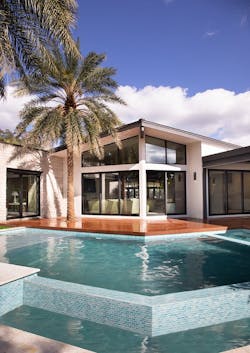The goals of the 2022 New American Remodel (TNAR) included raising the home's thermal performance to that of the best new construction. To do that, the building envelope needed to be made super-efficient. This is straightforward with walls and ceilings: add insulation and seal air leaks. Windows are more complicated, especially when the goals also include historic preservation.
This 1963 structure is unique — architect Phil Kean calls it the best mid-century modern home in Orlando. It resembles a Frank Lloyd Wright home, and remodeler Eric Gray, who has owned it for years, believes the architects were Wright's students.
Wright was known for skillfully blending interiors and exteriors, with lots of glass to bring in natural light. That's certainly the case in this home. Its central core is a great room with a cathedral ceiling that extends from the front of the house to the back yard. The gables at either end are filled with glass, a combination of fixed windows and sliding or hinged doors.
The old windows and doors would have to be replaced, but that posed two challenges. First, those at the front would need to be architecturally correct, with the same sizes and shapes as the old ones. And those at both ends needed better glass. JELD-WEN Siteline aluminum and clad-wood windows and patio doors and LaCantina sliding doors satisfied both requirements.
Two features made JELD-WEN a great fit for this project. First, they manufacture all windows to-order, and were able to make the new windows at the front gable visually indistinguishable from the originals. The second is their products' performance.
Drew Smith of Two Trails, Inc., TNAR's energy and sustainability consultant, says that glass can make or break a project like this. "It's one of the first things we model," he says. "We want the insulating value of the glass to be as close as possible to that of the walls." Not surprisingly, this is a balance between cost and performance.
Smith models home performance with Energy Gauge, a simulation software developed by the Florida Solar Energy Center. He looks at how different glass choices will affect home energy use and compares efficiency and cost to determine the best return on investment.
"There's a lot of back and forth between Phil Kean and I during this process," says Smith. "For instance, if 10% more efficient windows will cost $20,000 more, but it will take 20 years for the energy savings to recoup that extra cost, it's probably not a great ROI." In the end, the windows and doors they chose had U-factors of .45 and solar heat gain coefficients of .22, which is much better than the Orlando averages of .30 and .55, according to Smith.
While glass is a big deal, so is frame construction. A solid window or door frame will conduct heat and become a thermal weak point, but the LaCantina products in this home have frames with built-in thermal breaks. "Even in the hot Florida sun, you can touch the inside of the frame and it still feels cool," says Smith. From ENERGY STAR® certified solutions to dual- and triple-pane models featuring insulating glass with Low-E coatings, JELD-WEN windows let homeowners enjoy their views without worrying about their thermal performance.
The results achieved by these efforts are truly impressive. Pre-remodel, Smith calculated a score from the Home Energy Rating System (HERS) of 115, or 15% less efficient than the average new home. The finished home scored -22 — low enough for it to earn Net Zero Energy certification, which means rooftop solar panels will more than offset its annual energy needs.
Such results are only possible with good modeling software and the right product choices. And the most critical choices include windows and doors.
The JELD-WEN supplied windows and doors used in the 2022 New American Remodeled Home in Orlando satisfied all the project's architectural and performance goals. They included Siteline Wood & Clad-Wood Windows & Patio Doors and LaCantina Aluminum Thermally Controlled Sliding Doors.


